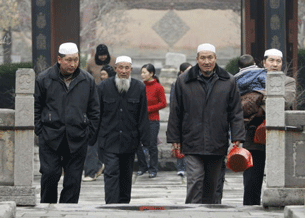China jails 14 over mosque clash
| Publisher | Radio Free Asia |
| Publication Date | 25 June 2012 |
| Cite as | Radio Free Asia, China jails 14 over mosque clash, 25 June 2012, available at: https://www.refworld.org/docid/4ff59d982.html [accessed 1 June 2023] |
| Disclaimer | This is not a UNHCR publication. UNHCR is not responsible for, nor does it necessarily endorse, its content. Any views expressed are solely those of the author or publisher and do not necessarily reflect those of UNHCR, the United Nations or its Member States. |
2012-06-25
Authorities in northwestern China sentence a group of Hui Muslims who fought to protect their place of worship.
 File photo of China's minority Hui Muslims in northwest Shaanxi province. AFP
File photo of China's minority Hui Muslims in northwest Shaanxi province. AFP
Authorities in the northwestern Chinese region of Ningxia have handed jail terms of up to six years to 14 ethnic minority Hui Muslims for "inciting violence" and "obstructing public duty," following clashes over the destruction of a mosque at the end of last year, local residents said.
Police in Tongxin county near Ningxia's Wuzhong city detained around 40 Muslim Hui people following riots last New Year's Eve sparked by the forced demolition of a local mosque. Four were later released, and 36 stood trial on April 24.
"Right now, they have sentenced 14 people [to prison]," said a Tongxin resident surnamed Jin. "The rest have all been given suspended sentences."
The Tongxin County People's Court handed down two six-year jail terms and two five-year jail terms, with shorter sentences handed out to the rest of the defendants, their relatives said.
Jin said his uncle, Jin Kecheng, and his father, Jin Yuxiang had received the two six-year sentences, while his brother, Jin Haijun, had been sentenced to three years' imprisonment.
Jin said his family had been involved with attempts to stop the authorities from demolishing the local mosque, which local residents had built with their own money.
"After they came to demolish the mosque, my brother went there to stop them ... and was charged with obstructing official duty," Jin said. "My uncle was the first to get sent to jail because he was the person in charge of the mosque when it was demolished."
He said all of the men sentenced last week had vowed to appeal to the Intermediate People's Court, and their relatives were out of town trying to find lawyers for them.
Beijing-based rights lawyer Liu Xiaoyuan said that appeals are unlikely to be successful in such cases, which Beijing sees as crucial for maintaining social stability, however.
"In such 'stability maintenance' cases, the likelihood of a decision being reversed on appeal once it has been made in the first instance is very small indeed," Liu said.
"[In such cases,] the intermediate court will seek an interpretation from the higher court, which might ask the politics and law committee of the local Communist Party for advice on how to proceed," he said.
"The defendant has the legal right to appeal, and it's very sad that local lawyers don't dare to offer their services," Liu added.
Rare criticism
The December clashes between Hui Muslims and police in Tongxin's Taoshan village drew rare criticism from a key global Islamic group.
In a statement, the 57-nation Organization of Islamic Cooperation (OIC) condemned the violence and the "heavy-handed" response of local authorities.
The group also called on China to respect the rights of Muslims to construct and maintain their places of worship and to freely attend religious services.
According to a Hong Kong-based rights group, the riots were sparked when hundreds of Muslims in Taoshan village tried to prevent the demolition of a mosque they had paid for.
Some reports said at the time that several people died, a claim which officials later denied.
Hundreds of Taoshan residents confronted police armed with tear gas, truncheons, and knives, Hong Kong's South China Morning Post reported at the time.
Local Hui Muslims told Hong Kong media they had spent more than 8 million yuan (U.S. $1.27 million) on the mosque, only to have it torn down by the authorities, who had attacked them with "police batons and bayonets."
The Hui are culturally more similar to mainstream Han Chinese than Xinjiang's Turkic-speaking Uyghur people, but retain some Islamic customs like avoiding pork and circumcising male children.
Ethnic tensions have nonetheless flared in recent years, notably in riots following a 2004 car accident involving a Han Chinese and a Hui Muslim in the central province of Henan.
And in 1993, a cartoon ridiculing Muslims led to police storming a mosque taken over by Hui in northwestern China.
China's atheist ruling Party maintains a tight grip on religious activities, in spite of promising freedom of religion via the Constitution, allowing only officially recognized religious institutions to operate.
In Xinjiang, Uyghur children are banned from attending mosques until they reach 18, and are forced to eat during the fasting month of Ramadan, Uyghurs say.
Xinjiang Communist Party religious affairs officials involve themselves in every aspect of religious life, including approving sermons in mosques and dictating which interpretations of the Quran will be used.
China's official media rarely report incidents involving ethnic conflict and, when they do, are usually under orders to use only approved dispatches from the state-run Xinhua News Agency.
Reported by Hai Nan for RFA's Cantonese service. Translated and written in English by Luisetta Mudie.
Link to original story on RFA website
